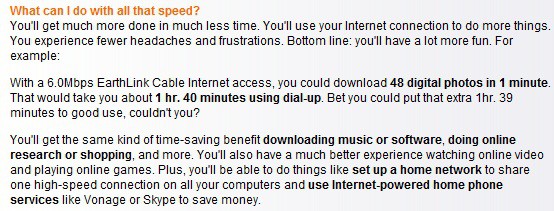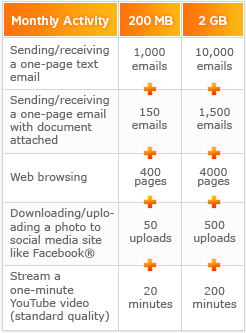
The days may be numbered for Sunflower Broadband
A Kansas cable system notorious for Internet Overcharging is nearing a deal to be acquired by a cable overbuilder that does not usage cap broadband customers.
Sunflower Broadband, an independent cable system providing cable, phone, and broadband service to 30,000 Lawrence residents, is expected to be acquired by Georgia-based cable overbuilder Knology, which has been on a buying spree of late. The asking price – $127 million dollars, according to a report in the cable trade journal Multichannel News.
Sunflower has been overcharging their broadband customers for years with schemes like usage caps and a flat rate service plan that delivers speed throttled broadband service to customers. Sunflower has remained a hot topic for Stop the Cap! because we hear so many complaints from their long-suffering customers. In fact, no independent cable operator has generated more reader complaints than Sunflower Broadband, almost all targeting the company’s unjustified usage caps.
Broadband Reports reminds us Sunflower was among the first to implement the idea of low caps and high overages ($2 for each additional gigabyte). Customers also routinely complain about Sunflower’s stingy upstream speeds, maxed out at just 1Mbps for their $60 Gold tier.
None of the details about Sunflower Broadband’s impending sale can be found in the local newspaper — the Lawrence Journal-World or the local “Channel 6” news operation. That’s ironic, considering the same parent company that owns Sunflower Broadband, The World Company, also happens to own the newspaper and Channel 6. It took a cable trade publication based hundreds of miles away to break the story — not exactly a shining moment for journalism in Lawrence, especially considering an LJWorld reporter need not break a sweat to chase the story.
Part of the reason for the sale may have been AT&T bringing U-verse competition to Lawrence. U-verse does not have customer unfriendly usage limits. With AT&T ready to usher away many of Sunflower’s customers, management may have decided now was a good time to sell.
The good news for Lawrence residents is that none of Knology’s cable systems engage in Internet Overcharging schemes, so Sunflower’s usage caps may be gone after the sale.
Still, some Lawrence residents are concerned about the implications of a Knology takeover. The Lawrence Broadband Observer is among them:
I browsed Knology’s corporate web site and was actually pretty unimpressed. To put it mildly, Knology is well behind Sunflower both geographically and technically. Knology offers service in rural areas much smaller then Lawrence, like Storm Lake, Iowa and Dothan, Alabama. They also offer service in a few towns that are equal or larger then Lawrence like Charleston, South Carolina.
Technically, Knology is well behind Sunflower in what they offer customers in other cities. Top internet speeds (albeit cap-free) are only in the 8-10 megabit range, five times slower then Sunflower’s new DOCSIS 3 offerings. On the television side, while it varies from city to city, Knology generally offers only 30 or so HD channels, which is less then half of what Sunflower offers. Knology offers a rudimentary DVR, but nothing like Sunflower’s multi-room options.
Perhaps Knology is interested in buying Sunflower to learn how to offer more advanced services, knowledge they can take to their other markets. I don’t know, but it seems like this is a case of a large buggy-whip manufacturer buying out a smaller company that makes automobiles.
 Most of Knology’s network of systems have been acquired from other companies and providers. Technically, they are a cable “overbuilder” because they do overlap other providers in some areas, such as Knoxville, Tenn., where they compete with Comcast. In many communities, they are most common in rental parks and apartments.
Most of Knology’s network of systems have been acquired from other companies and providers. Technically, they are a cable “overbuilder” because they do overlap other providers in some areas, such as Knoxville, Tenn., where they compete with Comcast. In many communities, they are most common in rental parks and apartments.
Knology’s customers in other cities have usually suffered some transitional glitches (Knology uses a more “advanced e-mail system” they eventually forced their PrairieWave customers to join), but overall they have usually increased broadband speeds in their markets and add lots of new HD channels. Knology is aggressively deploying DOCSIS 3, something Sunflower already has, so few changes should be expected there. They do not have a history of downgrading customers.
Clues about the impact of a Knology buy can be found in communities like Rapid City, S.D., who saw their cable system switched from Black Hills FiberCom to PrairieWave to Knology. Rapid City residents first saw changes to the cable system’s technology and billing. That was followed by the introduction of new services and packages, and then finally the name change to Knology.
With the anticipated sale, existing Sunflower customers (and ex-customers) might want to impress on the new owner that Internet Overcharging schemes like usage caps and throttled speeds are unacceptable, and you want an immediate end to both.
Remember too it could be worse — Mediacom could have been the buyer.
 “The World Company is complimented that a number of companies have expressed interest in its Sunflower division over the years. This continues today. There is no definitive agreement concerning Sunflower with any company at this time.” — Dolph C. Simons Jr., Chairman, The World Company
“The World Company is complimented that a number of companies have expressed interest in its Sunflower division over the years. This continues today. There is no definitive agreement concerning Sunflower with any company at this time.” — Dolph C. Simons Jr., Chairman, The World Company

 Subscribe
Subscribe






